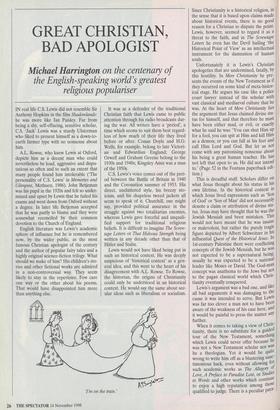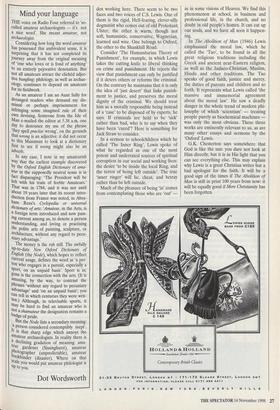GREAT CHRISTIAN, BAD APOLOGIST
the English-speaking world's greatest religious populariser
IN real life C.S. Lewis did not resemble Sir Anthony Hopkins in the film Shadowlands: he was more like Ian Paisley. Far from being a shy, self-effacing, sensitive scholar, C.S. 'Jack' Lewis was a sturdy Ulsterman who liked to present himself as a down-to- earth farmer type with no nonsense about him.
A.L. Rowse, who knew Lewis at Oxford, depicts him as a decent man who could nevertheless be loud, aggressive and dispu- tatious so often and to such an extent that many people found him intolerable (`The personality of C.S. Lewis' in Memories and Glimpses, Methuen, 1986). John Betjeman was his pupil in the 1920s and felt so under- mined and upset by Lewis that he failed his exams and went down from Oxford without a degree. In later life Betjeman accepted that he was partly to blame and they were somewhat reconciled by their common devotion to the Church of England.
English literature was Lewis's academic sphere of influence but he is remembered now, by the wider public, as the most famous Christian apologist of the century and the author of popular fairy tales and a highly original science-fiction trilogy. What should we make of him? His children's sto- ries and other fictional works are admired in a non-controversial way. They seem likely to stay in the repertoire. Few care one way or the other about his poems. That would have disappointed him more than anything else. It was as a defender of the traditional Christian faith that Lewis came to public attention through his radio broadcasts dur- ing the war. All writers have a 'period', a time which seems to suit them best regard- less of how much of their life they lived before or after. Conan Doyle and H.G. Wells, for example, belong to late Victori- an and Edwardian England; George Orwell and Graham Greene belong to the 1930s and 1940s; Kingsley Amis was a man of the 1950s.
C.S. Lewis's voice comes out of the peri- od between the Battle of Britain in 1940 and the Coronation summer of 1953. His direct, uncluttered style, his breezy sto- icism, and his shapeless tweed jackets all seem to speak of it. Churchill, one might say, provided political assurance in the struggle against two totalitarian enemies, whereas Lewis gave forceful and unquali- fied support for traditional religious beliefs. It is difficult to imagine The Screw- tape Letters or That Hideous Strength being written in any decade other than that of Hitler and Stalin.
Lewis would not have liked being put in such an historical context. He was deeply suspicious of 'historical context' as a gen- eral idea, and this went to the heart of his disagreement with A.L. Rowse. To Rowse, the historian, the origins of Christianity could only be understood in an historical context. He would say the same about sec- ular ideas such as liberalism or socialism.
on the train.' Since Christianity is a historical religion, in the sense that it is based upon claims made about historical events, there is no good reason for a Christian to dispute the point. Lewis, however, seemed to regard it as a threat to the faith, and in The Screwtape Letters he even has the Devil hailing 'the Historical Point of View' as an intellectual instrument for the damnation of human souls.
Unfortunately it is Lewis's Christian apologetics that are undermined, fatally, by this hostility. In Mere Christianity he pre- sents the events of the New Testament as if they occurred on some kind of meta-histor- ical stage. He argues his case like a police court lawyer instead of the scholar with vast classical and mediaeval culture that he was. At the heart of Mere Christianity lies the argument that Jesus claimed divine sta- tus for himself, and that therefore he must have been either mad, or evil, or exactly what he said he was: 'You can shut Him up for a fool, you can spit at Him and kill Him as a demon; or you can fall at his feet and call Him Lord and God. But let us not come with any patronising nonsense about his being a great human teacher. He has not left that open to us. He did not intend to.' (Page 52 in the Fontana paperback edi- tion.) This is dreadful stuff. Scholars differ on what Jesus thought about his status in his own lifetime. In the historical context in which Jesus lived expressions such as 'Son of God' or 'Son of Man' did not necessarily denote a claim or attribution of divine sta- tus. Jesus may have thought that he was the Jewish Messiah and been mistaken. This would not have meant that he was insane or malevolent, but rather the purely tragic figure depicted by Albert Schweitzer in his influential Quest of the Historical Jesus. In 1st-century Palestine there were conflicting concepts of the Jewish Messiah, but he was not expected to be a supernatural being; usually he was expected to be a national leader like Moses or David. The God-man concept was anathema to the Jews but not to the pagan classical world which Chris- tianity eventually conquered. Lewis's argument was a bad one, and like all bad arguments it was damaging to the cause it was intended to serve. But Lewis was far too clever a man not to have been aware of the weakness of his case here, and it would be painful to press the matter any further.
When it comes to taking a view of Chris- tianity, there is no substitute for a guided tour of the New Testament, something which Lewis could never offer because he was 'not a New Testament scholar nor was he a theologian. Yet it would be quite wrong to write him off as a blustering sanc- timonious hack, even without allowing for such academic works as The Allegory .0.f Love, A Preface to Paradise Lost, or Studies in Words and other works which continue to enjoy a high reputation among those qualified to judge. There is a peculiar para- dox working here. There seem to be two faces and two voices of C.S. Lewis. One of them is the rigid, Hell-fearing, clever-silly dogmatist who comes out of old Protestant Ulster; the other is warm, though not soft, humanistic, conservative, Wagnerian, learned and wise. One belongs to Oxford, the other to the Shankhill Road.
Consider 'The Humanitarian Theory of Punishment', for example, in which Lewis takes the cutting knife to liberal thinking on crime and punishment. He rejects the view that punishment can only be justified if it deters others or reforms the criminal. On the contrary he maintains that it is only the idea of 'just desert' that links punish- ment to justice, and preserves the moral dignity of the criminal. We should treat him as a morally responsible being instead of a 'case' to be disposed of by experts, he says. If criminals are held to be 'sick' rather than bad, who is to say when they have been 'cured'? Here is something for Jack Straw to consider.
In a sermon to schoolchildren which he called 'The Inner Ring', Lewis spoke of what he regarded as one of the most potent and underrated sources of spiritual corruption in our social and working lives: the desire 'to be inside the local Ring, and the terror of being left outside'. The true `inner ringer' will lie, cheat, and betray rather than be left outside.
Much of the pleasure of being 'in' comes from contemplating those who are 'out' — as in some visions of Heaven. We find this phenomenon at school, in business and professional life, in the church, and no doubt in old people's homes. It can eat up our souls, and we have all seen it happen- ing.
In The Abolition of Man (1946) Lewis emphasised the moral law, which he called the 'Tao', to be found in all the great religious traditions including the Greek and ancient near-Eastern religion, as well as the Judaeo-Christian, Muslim, Hindu and other traditions. The Tao speaks of good faith, justice and mercy, the duties of parents and children and so forth. It represents what Lewis called 'the massive and immemorial agreement about the moral law'. He saw a deadly danger in the whole trend of modern phi- losophy of which 'scientism' — treating people purely as biochemical machines was only the most obvious. These three works are eminently relevant to us, as are many other essays and sermons by the `Oxford' Lewis.
G.K. Chesterton says somewhere that God is like the sun: you dare not look at Him directly, but it is in His light that you can see everything else. This may explain why Lewis is a great Christian writer but a bad apologist for the faith. It will be a good sign of the times if The Abolition of Man is still in print 100 years from now: it will be equally good if Mere Christianity has been forgotten.



















































































 Previous page
Previous page